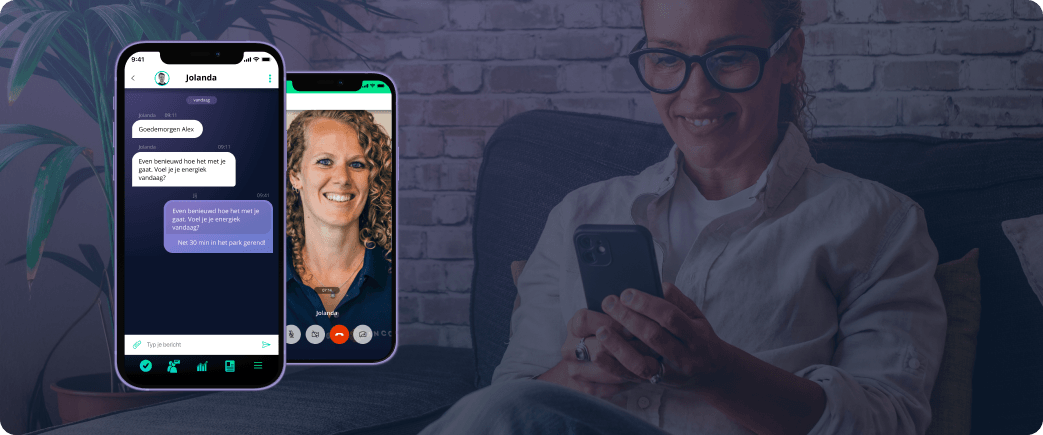20/6/23 By Rahul Gannamani
Getting healthier sustainably: the power of micro habits

For people to get healthy and stay healthy, lifestyle adjustments are often necessary. But new habits are difficult to maintain. Ancora’s micro-habits approach is a powerful way to sustain the desired behavioral change. Digitally supported coaching makes this approach extra effective. In this blog I explain more about micro habits and their advantages.
Tags: micro habits, e-health, lifestyle medicine, GLI, BJ Fogg, chronic diseases, overweight, obesity, healthcare system
What’s in this blog:
Health may be the greatest human blessing, as Hippocrates wrote, but unfortunately it cannot be taken for granted.
No less than sixty percent of the Dutch population, more than 10 million people, has a chronic health condition [1]. Many of these conditions – such as cardiovascular disease, type 2 diabetes and COPD – are related to lifestyle. Not surprising considering that about half of the adults in the Netherlands are overweight, only just below the European average of six in ten [2].
Making the figures on chronic diseases and obesity even more alarming is that they keep growing every year. Despite all the education from doctors and government programs, despite the countless diets tried by millions, the number of overweight people keeps increasing.
Now, this is not because people lack the desire to control their weight. The health risks of being overweight are well known. Most people would love to lose a few kilos. However, wanting to convert this wish into concrete results remains a major challenge.
‘Obesogenic environment’
Why is a lifestyle change so difficult? There are several reasons. For starters, we live in an obesogenic environment with countless temptations facing us every day. Beautifully presented food is shown to us in advertising and on the supermarket shelves in a way that is hard to ignore. Resisting the temptations is rarely easy.
When we try to adopt different behaviors or make different choices, an additional problem is that we have to do two different things at the same time. On the one hand, we have to let go of existing habits; on the other, we have to make new ones our own. When things go against us – and that moment will inevitably come – we can quickly slip back into our old routines.
The danger, then, is that we give up. It won’t work, we think, not realizing that our ‘failure’ may only have been a temporary dip.
Another characteristic of lifestyle change is that we often set big, sometimes unrealistic goals for ourselves. We want to “lose 30 kilos quickly” or “run a marathon this year”. With such goals, there is a big chance we will disappoint ourselves. We become filled with self-criticism and lose self-confidence.
Learning micro habits, i.e. changing our behaviors with small steps, is a method that avoids this pitfall.
Micro-habits produce excellent, long-lasting results. The method forms the basis of Ancora’s lifestyle program with which we have been able to help over 1000 people improve their health, micro habits fitting well with our digitally supported approach.

Fogg Behavior Model
Our approach is inspired by the so-called Fogg Behavior Model, developed by researcher and coach BJ Fogg, founder of the Stanford Behavior Design Lab at Stanford University. Fogg is the author of the 2020 book Tiny Habits, The Small Changes That Change Everything, with which he introduced micro habits to a wide audience [3].
Three pillars are central to micro habits. First, we select a habit that we want to teach ourselves and start with very small steps. When it comes to getting more exercise, for example, a micro habit could be walking for 5 minutes every day. If we want to meditate more, we could start with three ‘conscious breaths’ every day. Or if the intention is to read more, we start with one paragraph a day. “You make it so simple that it’s like you have no excuse not to do it,” says Fogg [4].
The second pillar is to find ways to give the habit a permanent place in our daily routine. For example, we can take the short walk every day after lunch. We can read the paragraph in public transport on the way to work. If we continue reading past that first paragraph, that’s fine, but we don’t have to. With one paragraph we have already done our job.
The third pillar is that we celebrate and reinforce the habit. Every time we do what we set out to do, we make sure we are aware of it and that we create a reward that makes us feel positive. “Whatever it is that helps you feel successful will help you stick to your habit”, explains Fogg. A reward could be a pat on the back that you give yourself, a success song that you play in your head or a fist pump: everything is imaginable.
Positive to ourselves
Research by Fogg shows that small adjustments can ultimately lead to lasting major behavioral changes. How you think about yourself changes, according to Fogg. “You start thinking, ‘Oh, I’m the person who tidies’, or ‘I’m the person who meditates’, or ‘I’m the person who reads’.” The habit spreads to other areas of life.
Central to the Fogg model is the idea that two main conditions must exist before we can achieve successful behavior change.
First of all, we must be motivated and realistically able to implement the change. Second, there must be an incentive or cause for adopting the new behavior. Major lifestyle changes require a lot of motivation, which can sometimes be a significant threshold. But micro habits are easy to do. They make us stay positive towards ourselves, which is the basis for slowly expanding other good behaviors.

Digital opportunities
Anyone considering a lifestyle change will certainly benefit from the micro-habits approach. And with digitally supported coaching, as Ancora has applied, the method offers many extra opportunities.
As psychologists know, feedback is at the heart of behavior learning. However, many aspects of our lifestyles traditionally lack direct feedback.
Whether healthy behavior such as more exercise and better sleep really has an effect on our health often only becomes clear as we grow older when health issues start to emerge.
Digital tools such as a wearable bracelet, a digital scale and Ancora’s mobile app create a continuous stream of feedback for the people who participate in our programs.
This makes the efforts to improve health measurable and tangible. As we notice daily in our coaching work, participants feel better maintained when they can see evidence of their progress.
With lifestyle coaching in a clinical setting there are often only a few contact moments per month or quarter. Digitally supported coaching has the advantage that feedback is continuously available. Participants can select individual goals with their coach, on which they can monitor their progress. This gives them more control over their behavior change. They can discuss their data with their coach and pinpoint when certain stumbling blocks occur and what the cause may be.
Our research shows that the micro-habits approach in combination with digitally supported coaching gives excellent results. The concept can be of great added value for the Dutch healthcare system with its increasing capacity problems.
Moreover, the approach is easily scalable and places less of a burden on healthcare than many other lifestyle change solutions. Micro habits with digital support give people more control over their behavior and health. Not only will people have to rely on care less often, but they will also have more healthy life years to look forward to.
Rahul Gannamani is a physician and co-founder and head of health engagement at Ancora Health.
[1] https://www.vzinfo.nl/chronische-opathies-en-multimorbidity/age-and-gender
[2] WHO European Regional Obesity Report 2022 https://apps.who.int/iris/handle/10665/353747
[3] https://tinyhabits.com/book/
[4] https://www.npr.org/2020/02/25/809256398/tiny-habits-are-the-key-to-behavioral-change